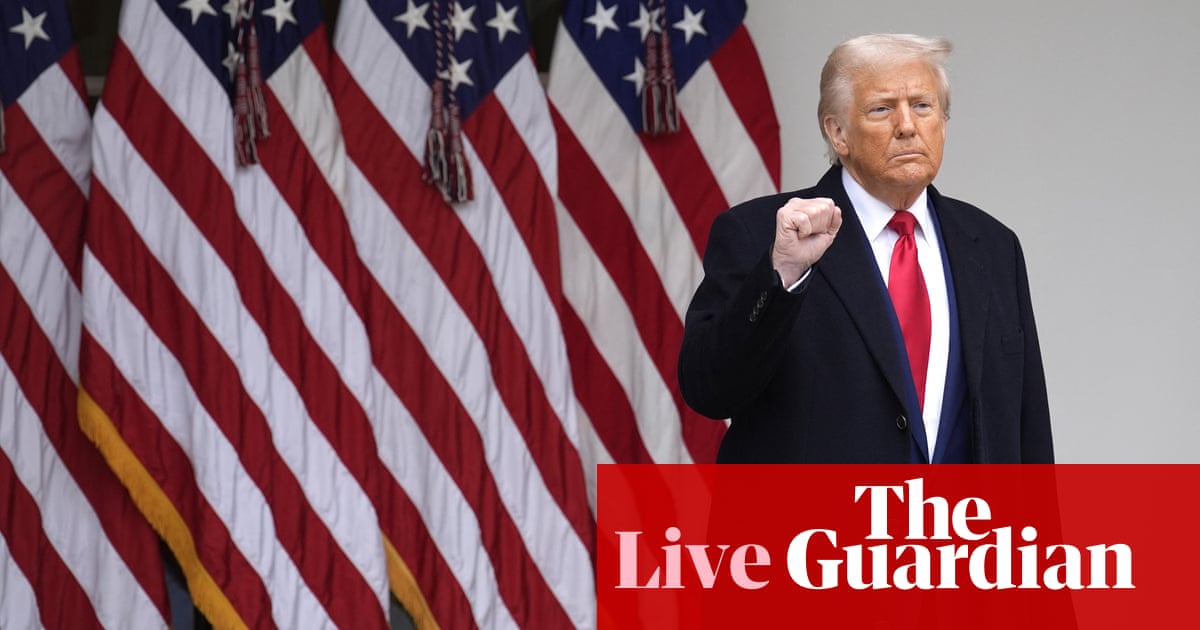Donald Trump is getting ready to impose sweeping and immediate tariffs on all foreign goods, thereby unleashing a trade war and upending the multilateral trading system that the US helped to build after the second world war.
Here is how Europe might respond:
Retaliation
The EU has already rejected one possible option: fold your cards. This message was reaffirmed by the European Commission president, Ursula von der Leyen, this week: “If it is necessary we have a strong plan to retaliate and we will use it.” EU officials hope for a negotiated settlement, but previous offers to buy more US liquified fossil gas – a trend already happening since Russia’s invasion of Ukraine – appear to have fallen on stony ground.
The EU approach contrasts with the UK, which is preparing to reduce the headline rate of its digital services tax in an attempt to placate Trump. But vowing retaliation is only the start. The questions are about what response the EU will have, how quickly it can be marshalled and whether divisions between member states will undermine the tough talk.
The bourbon and blue jeans plan
Imposing levies on emblematic US goods is the tried and tested European response to Trump tariffs. After Trump announced tariffs on steel and aluminium last month, the EU said it was preparing retaliatory duties targeting up to €26bn of US goods, such as bourbon, Harley-Davidson motorbikes and a wide array of farm produce and industrial goods.
The bloc has yet to retaliate against Trump’s levies on cars and car parts that are due to take effect on 3 April. In theory, the EU could levy more tariffs over these plans, as well as the latest “liberation day” duties. But EU officials will try to avoid hefty duties on goods that the bloc needs. Ignacio García Bercero, a former senior EU trade negotiator, said: “What matters is that you maximise the political impact and you limit to the maximum the economic impact [on the EU].”
Hit US banks and tech companies
In theory the EU has a long list of options to hit back at US economic interests: restrict JP Morgan’s business in Europe, tax Facebook and Meta, stop US companies bidding for European government contracts or limit their intellectual property rights. US services may be a tempting target, as the US runs a €109bn ($117bn) surplus in services with the EU, according to EU figures – although Trump is fixated on the US goods deficit with the EU, which is $236bn (€218bn), according to American data.
One senior EU official, speaking after the steel and aluminium tariffs in March, said the bloc was certainly not excluding a bigger, better and “even more creative” response, citing intellectual property rights and investment measures.
The long-range economic strike
The scale of Trump’s tariffs, which could return US duties to levels not seen since the 19th century, is intensifying calls to retaliate against US services. A former adviser to the French government, Shahin Vallée, and the French national assembly deputy David Amiel have said the EU needs “to be capable of launching long-range economic strikes against American economic interests, going beyond ‘simple’ trade tariff responses”.
Their wide-ranging recommendations include the possible use – for the first time – of the EU’s anti-coercion instrument. This is a potentially powerful regulation that gives the EU leeway to impose trade and investment restrictions on any government that appears to be using trade as weapon to browbeat a country into changing unrelated policies.
If Trump framed his tariffs as a grievance with EU VAT rates or tech regulation, said García Bercero, “this could be characterised fairly as being coercive action from the United States, which is basically seeking to get the European Union and the member states to change their policies on matters which they have the sovereign right to decide”.
Make new friends
Trump’s return to the White House has accelerated EU efforts to strike new trade deals and deepen existing ties with the rest of the world. Since his election, the EU has concluded 25 years of on-off trade talks with Mercosur; finalised or upgraded deals with Mexico, South Africa and Switzerland; revived talks with Malaysia and expressed hope of signing a free trade agreement with India in 2025. While success with Delhi and the ratification of Mercosur are far from done deals, the flurry of activity underscores the desire to shore up the traditional trade and diplomatic order.
(Try to) stick together
The EU response will depend on how tightly its 27 member states line up behind a common strategy in a trade war that could trigger economic turmoil and job losses in Europe. An early indication should come on Monday when EU trade ministers meet to discuss the retaliation planned for this month and other measures.
Nerves are building. France is worried about the fallout on its wines and spirits industry; Dublin fears an exodus of US multinationals headquartered in Ireland; and the Italian prime minister, Giorgia Meloni, has said the bloc should not act on impulse while the national industry group Confindustria has called for negotiations with the White House. Forging a common line will be critical to new forms of trade retaliation: for example, only a weighted majority of EU countries can decide whether the bloc is facing coercion from the US. That would be an outcome almost no one imagined a decade ago.

 German (DE)
German (DE)  English (US)
English (US)  Spanish (ES)
Spanish (ES)  French (FR)
French (FR)  Hindi (IN)
Hindi (IN)  Italian (IT)
Italian (IT)  Russian (RU)
Russian (RU)  22 hours ago
22 hours ago
























Comments